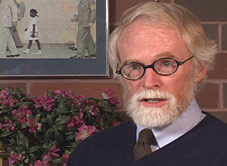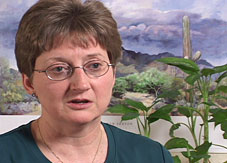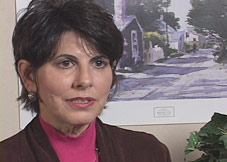 |
|
|
Videos
PO Box 2480Nevada City, CA 95959
Phone/Fax: 800-345-5530
(530-477-0701 outside US and Canada)
Email: info@cavalcadeproductions.com
 A Video Series for Child Protection Professionals:
A Video Series for Child Protection Professionals:
Trauma and Dissociation in Children
Abuse and neglect can have profound effects on children’s neurological development, and on their behaviors. The often devastating impacts of trauma–on children’s sense of self, on their ability to regulate their emotions, and on their capacity to talk about what has happened to them–can pose major challenges for child protective services workers, law enforcement investigators, forensic interviewers, and prosecutors. In this new video series, presented by the International Society for the Study of Trauma and Dissociation, leaders in the trauma field come together with experts on interviewing children and prosecuting abuse cases to give child protection professionals a grounding in the psychological impacts of abuse, and provide them with better tools for working with traumatized children. The series includes recent research on children’s recantation and inconsistent accounts. The presenters include Bessel van der Kolk, Christine Courtois, Kathy Steele, Fran Waters, Richard Kluft, Victor Vieth, John E.B. Myers, and Thomas Lyon. Released 2007.
I. Behavioral Impacts
II. Issues for Interviewers
III. Guidelines for Prosecutors Purchase price: One VHS/DVD $95, two $175, three $250 Customers who bought this video series also bought: About the Presenters Margaret E. Blaustein, PhD is Director of Training and Education at The Trauma Center in Boston, specializing in the assessment and treatment of complex childhood trauma. She is co-developer of the Attachment, Self-Regulation, and Competency treatment framework, and has provided numerous trainings on the impact of and intervention for childhood-onset trauma. Connie Carnes, MS LPC is Director of The Renewal Center, a professional counseling practice, and formerly directed the Clinical Research Program for the National Children’s Advocacy Center. Her clinical program models and manuals have been researched, published, and replicated internationally. Christine A. Courtois, PhD is Founder and Clinical and Training Consultant of The Center at the Psychiatric Institute of Washington, and in private practice in Washington, DC. She has authored three books, most recently Recollections of Sexual Abuse: Treatment Principles and Guidelines. Laurie Fortin, LCSW has specialized in the child sexual abuse field for 16 years, and conducts forensic interviews with children at the Chadwick Center, Rady Children’s Hospital, San Diego. She trains on the topic of child sexual abuse, and has been an expert witness in military and civilian court proceedings. Philip J. Kinsler, PhD is Adjunct Assistant Professor of Psychiatry at Dartmouth Medical School, where he supervises psychiatry residents’ diagnostic and therapy work. Dr. Kinsler is an experienced expert witness, and is extensively published in the fields of psychological trauma, suggestibility in interviews of children and adults, and ethical forensic practice. Richard P. Kluft, MD is Clinical Professor of Psychiatry at Temple University School of Medicine and member of the faculty of the Psychoanalytic Center of Philadelphia. He has published over 235 scientific papers and book chapters, and was Editor-in-Chief of the journal Dissociation for ten years. Thomas Lyon, PhD JD was an attorney for the Children’s Services Division of the Los Angeles County Counsel, and joined the USC Law faculty in 1995. His research interests include child witnesses, child abuse and neglect, and domestic violence. He is is past-president of the American Psychological Association’s Section on Child Maltreatment. Lisa McCulloch, LCSW worked for the County of San Diego’s Child Protective Services, and is currently a forensic interviewer at the Chadwick Center at Rady Children’s Hospital in San Diego. She is co-author of “A Model for Conducting Forensic Interviews With Child Victims of Abuse,” in Child Maltreatment, August, 1996. John E.B. Myers, JD is Professor of Law at the University of the Pacific, McGeorge School of Law in Sacramento. He has written numerous books and articles discussing evidentiary and constitutional issues in child abuse litigation, and is a regular speaker at conferences for judges, attorneys, and mental health professionals. Renee Potgieter, PhD has worked in the field of child therapy for the past 24 years, and is currently working as a consultant therapist in England, where she is involved in forensic work in family and private law. She also trains therapists and social workers on assessment, attachment, trauma and dissociation in children. Kathy Steele, MN CS is a psychotherapist with 25 years of experience. She is Clinical Director and Supervisor at Metropolitan Counseling Services, and in private practice specializes in chronic traumatization, dissociative disorders, and attachment issues. She has presented nationally and internationally on these topics for the past 15 years. Linda Cordisco Steele, MEd LPC is Curriculum Chair and Senior Trainer for the National Children’s Advocacy Center’s Child Forensic Interviewing Programs. She has twenty years of experience in therapy and advocacy work with victims, and is a regional and national trainer in forensic interviewing. Bessel van der Kolk, MD is Medical Director of The Trauma Center, which specializes in the study and treatment of survivors of severe psychological trauma, and Professor of Psychiatry at Boston University. He is co-author of Traumatic Stress: The Effect of Overwhelming Experiences on Mind, Body and Society. Victor Vieth, JD is Director of the National Center for the Prosecution of Child Abuse. He worked as a prosecutor in rural Minnesota, where he gained national recognition for his work to address child abuse in small communities. He is an international trainer on child abuse investigations, prosecutions, trial strategies, and prevention methods. Frances Saad Waters, DCSW LMFT, in private practice in Marquette, MI, has specialized in the field of child abuse for 35 years. She works as an educator, trainer, consultant, forensic evaluator, and clinician in the area of childhood trauma and dissociation. She is past president of the International Society for the Study of Dissociation and has published extensively on trauma and dissociation in children. The Trainer’s Guide The 65-page trainer’s guide includes objectives, reproducible viewer handouts, review and discussion questions, and a resource list. The appendices include articles on child trauma and forensic interviewing, two dissociation scales, and several articles on interviewing and children in the courtroom, described below. Cook, A., Spinazzola, J., Ford, J., Lanktree, C., Blaustein, M., et al. (2005). Complex trauma in children and adolescents. Psychiatric Annals, 35(5), 390 - 398. This article describes a new theoretical framework for understanding complex trauma in children, explains how to apply this framework to assessment of traumatized children and families, and discusses intervention models designed specifically for traumatized children and their families. Stolbach, Bradley C. (1986) Children’s Dissociative Experiences Scale and Posttraumatic Symptom Inventory. Provides 37-item scales for both girls and boys, with instructions for administration. Armstrong, Judith, Carlson, Eve Bernstein, and Putnam, Frank. Adolescent Dissociative Experiences Scale-II (A-DES). Provides a 30-item self-administered scale for adolescents, with directions. Waters, F. Forensic Evaluations of Children, ISSD News, Jan/Feb. 2004, p. 4-6. Discusses the forensic interviewing protocol, the extended forensic evaluation, building trust, attunement, gathering detailed information, and the need for child protection and safety. Lyon, Thomas D. (2005) Ten step investigative interview. Gives a detailed description of interviewer instructions and child narrative practice, designed to promote full and truthful disclosure and minimize leading questions. Finnegan, Martha, and Rogers, Laura. (2001) Preparing Kids for Court. Discusses children’s misconceptions about court, court-related stress, and the goals of court preparation. Lyon, T.D., & Saywitz, K.J. (2000) Qualifying Children to Take the Oath: Materials for Interviewing Professionals. Provides materials to assist in determining whether a child witness understands the difference between the truth and lies, and appreciates the importance of telling the truth. Myers, John E. B. Children’s Statements Describing Abuse Are Hearsay. Discusses three hearsay exceptions commonly used in child abuse and neglect litigation: the excited utterance exception, the medical diagnosis or treatment exception, and the residual and child hearsay exception. |


